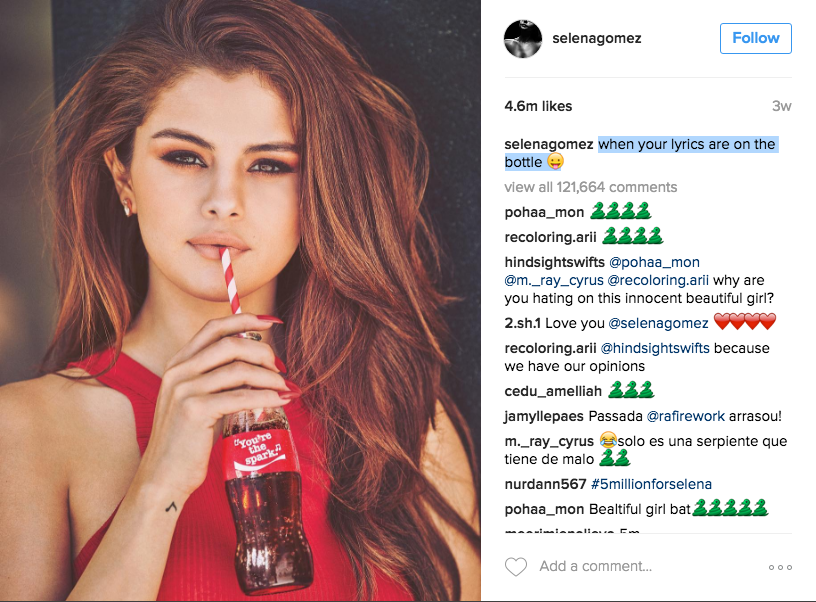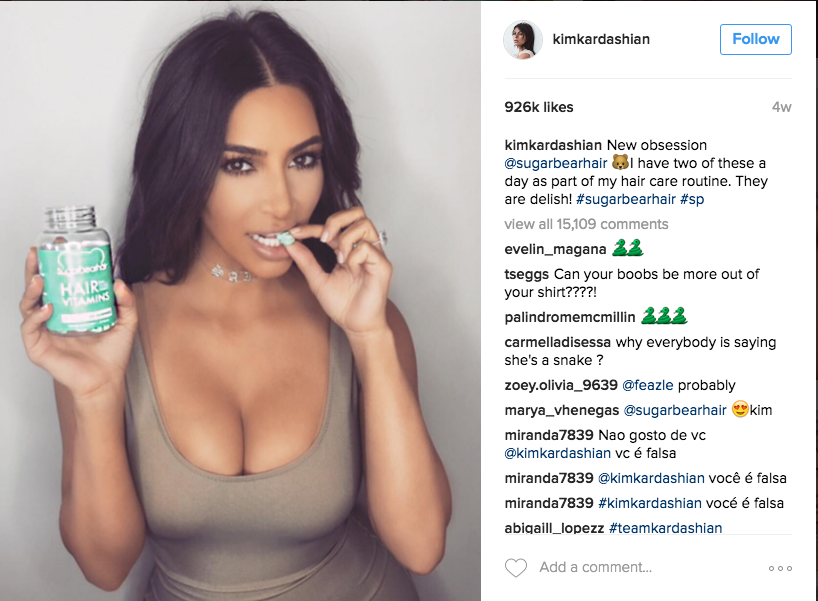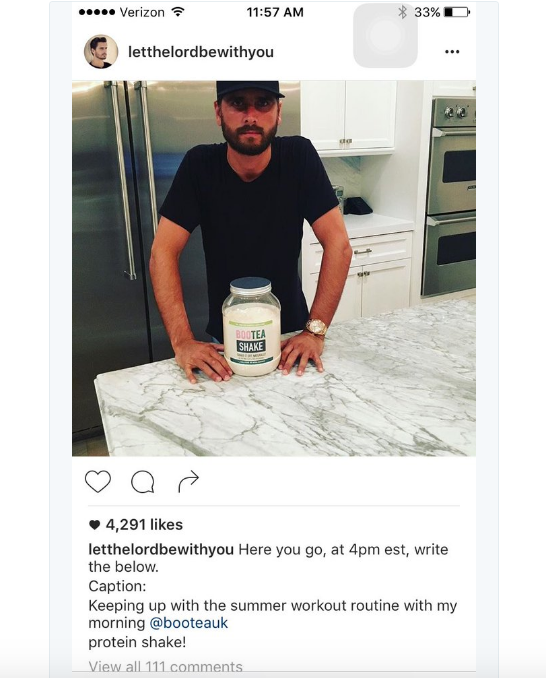Popular Instagram Photo Raises a Question About Ethics

By:
At first glance, there appears to be nothing unusual about the most liked Instagram photo of all time, a photo of Selena Gomez holding a bottle of soda.
But Gomez is holding a bottle of Coca-Cola, a company she officially endorses. And Gomez charges $550,000 per sponsored Instagram post.
This raises a big question.
Is the most well liked Instagram photo nothing more than an ad?
And, if so, does Gomez need to make that clear? If she doesn't, is that illegal?
The Fashion Law argues that Gomez's record-breaking photo is "likely illegal":
"As we’ve told you many times in the recent past, posting endorsements (which may be as simple as posting a photo on Instagram) – that have come about as a result of a connection between the endorsing party and the underlying brand – without proper disclosure often amounts to a violation of the Federal Trade Commission ('FTC') Act. The same is true for the posting of sponsored content (regardless of the medium). In particular, the FTC has held that in order to avoid violating the FTC Act by way of misleading or deceptive social media or native posts, promoting parties should use '#Ad', 'Ad:', or 'Sponsored' disclosures to indicate that a post or link within a post includes compensated content."
But it's not exactly as simple as that.
According to Federal Trade Commission's (FTC) regulations, bloggers/influencers who promote items on social media should always be clear about their endorsements.
From their Q&A section, ENDORSEMENTS BY INDIVIDUALS ON SOCIAL NETWORKING SITES:
Is there special wording I have to use to make the disclosure?
No. The point is to give readers the essential information. A simple disclosure like "Company X gave me this product to try . . . .'" will usually be effective.Do I have to hire a lawyer to help me write a disclosure?
No. What matters is effective communication, not legalese. A disclosure like "Company X sent me [name of product] to try, and I think it’s great" gives your readers the information they need. Or, at the start of a short video, you might say, "Some of the products I’m going to use in this video were sent to me by their manufacturers." That gives the necessary heads-up to your viewers.
Basically, the FTC wants influencers to always be upfront and disclose to their followers.
However...
If it's common knowledge that a major celebrity has an endorsement deal, it's a little different.
Gomez's endorsement with Coca-Cola isn't a secret. Furthermore, Gomez also posted a video on Instagram of her at the Coca-Cola offices.
The photo itself was carefully crafted by Coke, as described on the Coca-Cola website:
"'When we compose a shot like this, it feels real and authentic as well as complementary to the symmetrical Coke bottle,' said James Sommerville, Coke's VP of global design. '[Fashion photographer] Guy [Aroch] is a master at capturing these natural moments with amazing beauty and simplicity.'"
If it wasn't already clear that Gomez and Coke are partners, it's made even more clear by Gomez's lyrics printed on the label of the bottle, which she highlighted in her Instagram post:
 Selena Gomez/Instagram - instagram.com
Selena Gomez/Instagram - instagram.com
It would be like if Kobe Bryant (or Michael Jordan, if you're old school) posted a photo from a Nike shoot. Pretty much every reasonable person who interacts with humans and culture on a daily basis knows that Kobe and Nike are together. There would be no need for Bryant to disclose his relationship with them. From the FTC:
A famous athlete has thousands of followers on Twitter and is well-known as a spokesperson for a particular product. Does he have to disclose that he’s being paid every time he tweets about the product?
It depends on whether his followers understand that he’s being paid to endorse that product. If they know he’s a paid endorser, no disclosure is needed. But if a significant portion of his followers don’t know that, the relationship should be disclosed. Determining whether followers are aware of a relationship could be tricky in many cases, so we recommend disclosure.
But many celebrities are shady about their social media endorsements.
As stated above, the FTC always recommends full disclosure. That doesn't mean a celeb can just tweet a company's hashtag and count that as full disclosure. They need to be upfront that they are being paid to promote.
For example, this Instagram post by Kim Kardashian uses the hashtag #sp, which is shorthand for "sponsored post." The FTC instead recommends more obvious hashtags, like as #ad, #sponsored, and #promotion.
 Kim Kardashian/Instagram - instagram.com
Kim Kardashian/Instagram - instagram.com
Some celebs are upfront — by mistake.
Unofficial Kardashian spokesperson Scott Disick and "Real Housewife" Ramona Singer both accidentally posted the full text, including instructions, provided to them by copywriters to hawk the products on their Instagram pages.
 Scott Disick/Instagram - instagram.com
Scott Disick/Instagram - instagram.com
 Ramona Singer/Instagram - instagram.com
Ramona Singer/Instagram - instagram.com
Disick's and Singer's slip-ups offer an interesting glimpse into the world of celebrity partnerships with brands. In Singer's case, the brand includes language about the nature of the partnership, while the Disick post attempts to seem organic.
So how much disclosure is required in these sponsored posts?
Are you saying that I need to list the details of everything I get from a company for reviewing a product?
No. As long as your audience knows the nature of your relationship, it’s good enough. So whether you got $50 or $1,000 you could simply say you were “paid.” (That wouldn’t be good enough, however, if you’re an employee or co-owner.)
So what's the big deal?
The big deal, ultimately, is that celebrities are earning huge sums of money to sponsor products. And if users are expecting an ad-free glimpse into the lives of celebrities, then it's fair to say celebrities are violating that trust while reaping a healthy profit at the same time.
If celebrities are being shady about their endorsements, that means they're making money off of your eyeballs, your clicks, your likes, your shares, your views, in a possibly illegal way. That just makes everyone feel gross.
[H/T The Fashion Law]
